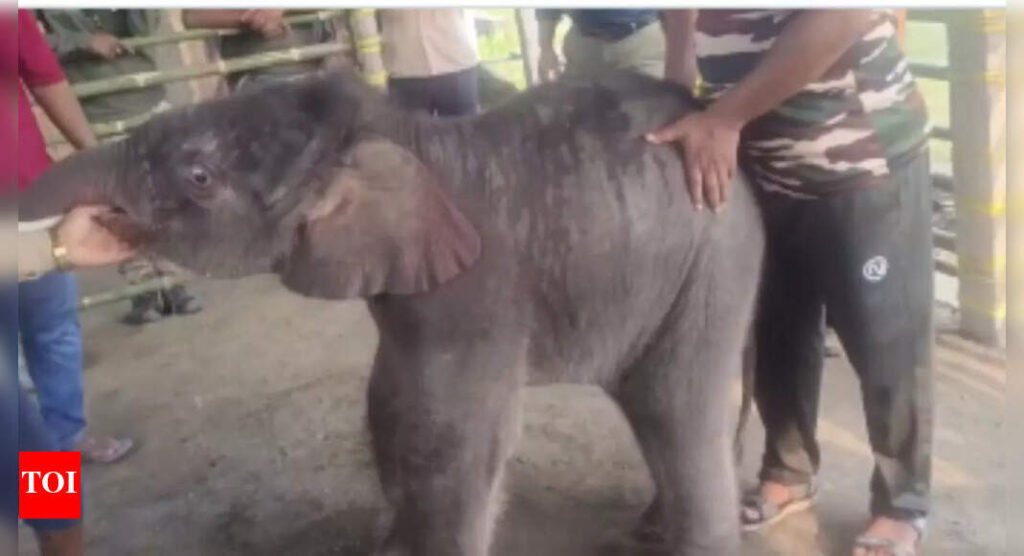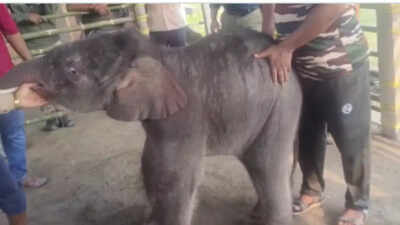Baby elephant rescued from floodwaters after heartbreaking rejection by mother: IFS officer shares emotional video | Watch |

A heart-wrenching incident in India has drawn attention to the vulnerability of wildlife and the crucial role of forest officials. A 15-day-old baby elephant, rescued from dangerous floodwaters, faced the devastating rejection of its mother, leaving humans to intervene to ensure its survival. The calf, completely dependent on maternal care at such a young age, required immediate expert attention to provide nourishment, safety, and emotional support. Indian Forest Service (IFS) officer Parveen Kaswan shared a video of the rescue, capturing the delicate handling and care involved. The footage has sparked widespread discussions on elephant behaviour, the impact of maternal rejection, and the importance of wildlife conservation, highlighting both the challenges and dedication involved in protecting vulnerable species.
Elephant calf faces flood danger and receives life-saving rescue from forest officials
Floods pose a significant threat to wildlife, particularly young and vulnerable animals. The calf, just 15 days old, was found struggling in the river during heavy floods. At this early age, elephant calves are extremely dependent on their mothers for survival. Their immune systems are not fully developed, and they require frequent feeding of mother’s milk.The rescue required precise planning. Forest officials carefully lifted the tiny elephant into a pickup truck to move her to safety. Mishandling at this stage could have led to injury or death. The video shared by Parveen Kaswan shows this delicate process, highlighting the professionalism and care involved.
Elephant calf rejected by mother: Understanding maternal rejection and its impact
One of the most distressing aspects of this case was the mother elephant’s rejection of her calf. While rare, maternal rejection is not unheard of in elephants. Experts attribute such behaviour to several factors:Stress or trauma: Floods and environmental disturbances can stress elephants, causing them to abandon their young.Health concerns: If the mother senses weakness or illness in the calf, instinct may lead her to reject it to conserve resources for healthier offspring.Separation timing: Young calves separated too long from their mothers may be rejected when reunited, as the mother may no longer recognise them.Maternal rejection at such a tender age has serious consequences. The calf loses not only nourishment but also emotional support and social learning from the mother, both of which are critical for survival.
Elephant calf placed in Pilkhana for expert care, nutrition, and emotional support
Following the failed reunion, the calf was placed under the care of a Pilkhana, a specialised facility for elephants. These centres provide:
- Nutrition: Feeding the calf with suitable milk formula and ensuring adequate hydration.
- Medical supervision: Monitoring for infections, injuries, or stress-related complications.
- Emotional care: Young elephants require social interaction and stimulation to prevent behavioural issues caused by isolation.
Kaswan confirmed that the calf is “healthy, active, and responding well,” reflecting the importance of skilled wildlife intervention in early-life crises.
Emotional and social impact on the calf
Elephants are highly social and emotionally intelligent animals. Separation from their mother can cause trauma, including stress, anxiety, and behavioural changes. Early maternal bonding is crucial for learning: calves observe their mothers to understand social cues, foraging techniques, and survival strategies.Without intervention, the calf would face difficulties in the long term. Care from trained specialists ensures she develops normally, mitigating the effects of maternal rejection and providing a safe path toward eventual reintegration with other elephants if possible. The video went viral on social media, with tens of thousands expressing sympathy and admiration. Public engagement plays a key role in raising awareness about wildlife issues. Comments highlighted both appreciation for the rescuers and concern for the calf’s emotional recovery.Also Read | Meet Australia’s geckos: Tiny lizards that can see 350 times better at night; key traits, habitat, survival and more







